Milking goats will of course be on your list of farm chores if you are breeding dairy goats. In order to keep your milk production in tip top shape, you'll need to know what causes decreased milk production in goats. And, if you experience a decrease, way of increasing milk production in goats.
Keep reading below for all the milk maximizing tips.
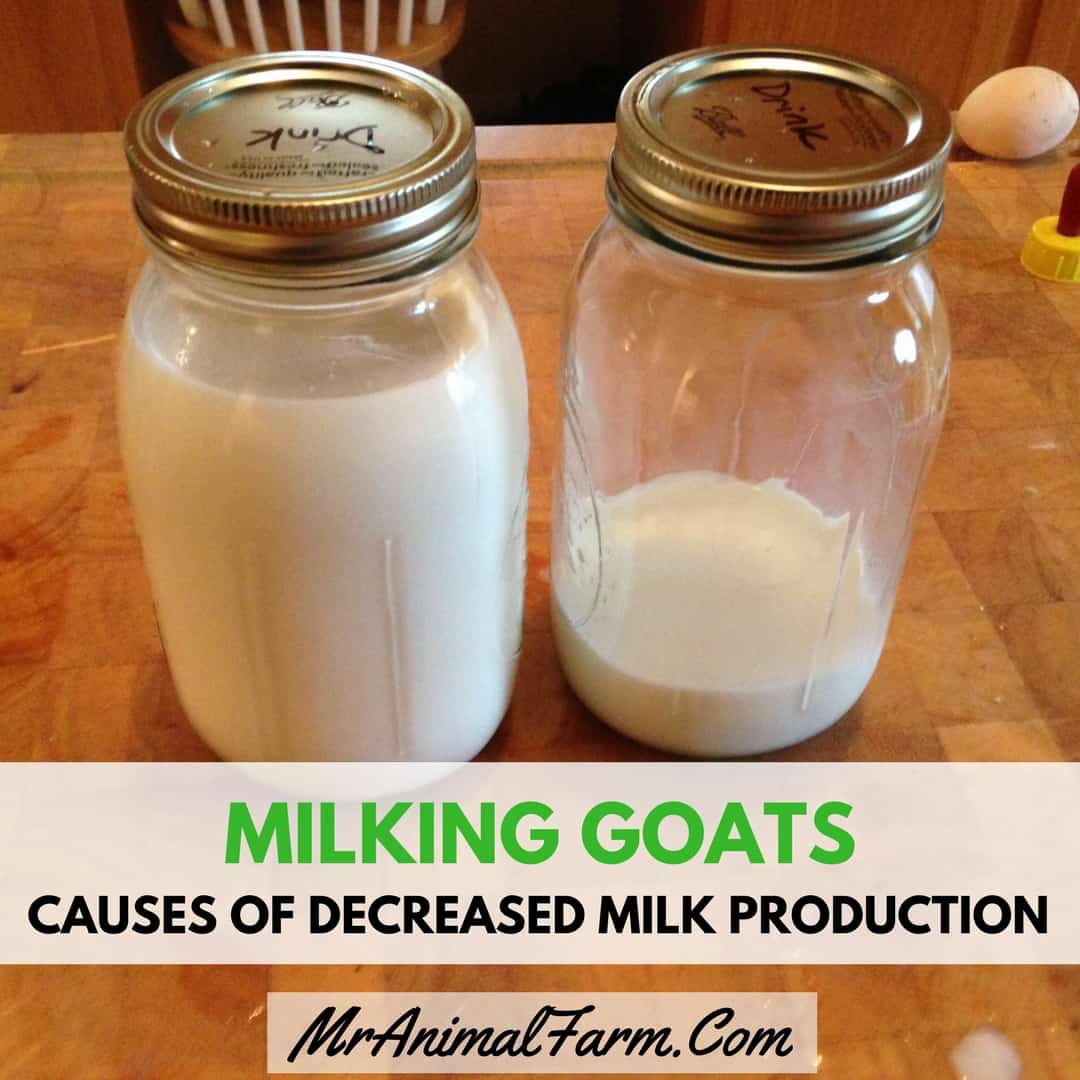
If you are milking your goats that means that you will be breeding your goats as well! Make sure to have a solid goat breeding plan before getting started.
Causes of Decreased Milk Production in Milking Goats:
There are several reasons that your goats might have decreased milk production - some are normal and inevitable while others could mean that your goats need some change or attention. So, let's review, shall we?
1. Time since freshening
When a goat first kids (has babies), they will come into milk. Their milk production will slowly increase over the first few weeks as the babies grow and have a higher milk supply demand.
However, once the kids are of weaning age, eventually, the goats milk production will decrease naturally. This natural decrease in milk production usually occurs a few months (around 4 - 5) after kidding.
How to increase their production: Make sure to re-freshen your goats about once a year, assuming their health is good. Additionally, if you want milk year round, stagger when your goats kid so they are not all hitting maximum production at the same time.

2. Demand
This, in sort, goes hand in hand with the reason above. There will be less supply if there is less demand -- standard economic theory which also applies to goat milk.If you are milking goats only one time a day, for example, there will be less demand for them to produce and therefore a decrease in milk production.
How to increase milk production: If you increase to milking your goats twice or even three times a day, this increase in demand should increase their milk production.

3. Feed & Nutrition.
Producing milk is a heavy chore for your goats. It takes a lot of nutrients and a lot of their energy.
Therefore, if you see a decrease in milk production, you may want to take a look at their feed intake. Make sure they are getting enough feed and also make sure that feed is high quality.
Tips for increasing milk production: Alfalfa (either pellets, hay or both) is highly suggested for milking goats. Alfalfa is highly nutritious having high protein and high calcium. Making all that milk takes a lot of calcium!
Adding in other highly nutritious treats like beet pulp, high quality grain in addition to the alfalfa will help as well.
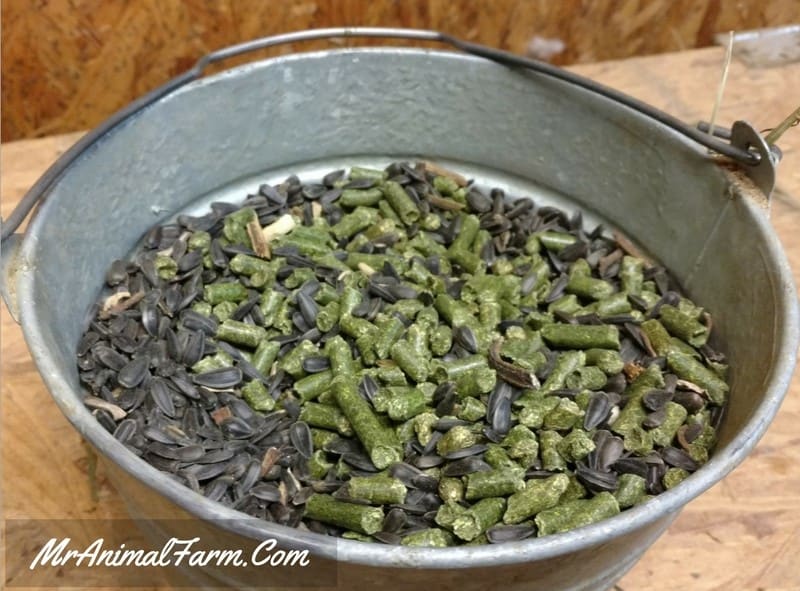
4. Parasites or other health issues.
As we have mentioned, producing milk is hard work. If your goat has a high parasite load or other health issue, there's a chance you'll experience decreased milk production.
It is recommended that you keep a check on parasites especially to be sure that your milking goats don't get an overload. If they do, you will need to choose the best goat dewormer and get rid of the worms.

Do note, that if you are drinking your goat milk, some dewormers have a withdrawl period where you will need to toss the milk.
Additional tips for increasing milk production in goats
In addition to the above, here are some additional tips to maximize the milk you get from your goats.
- Increased Water - make sure that your goats are well hydrated.
- High Quality Goats/Selective Breeding - make sure you are maintaining goats that are bred for high production over long lactations
- Age - first fresheners will produce less overall and as goats get much older they may produce less also
- Good quality Minerals - this increases their nutrition to ensure they have the nutrients required to produce milk
- Consistent Milking - milk two to three times everyday and try to do it at the same time each day.
Now that you know some of the causes of decreased milk production in milking goats, you can be sure to keep your girls in tip, top producing states! Drop us a comment below if you have any questions.
If you need more help getting your goat breeding running smoothly, check out The Ultimate Goat Breeding Planner - checklists, record sheets, supply lists and more to keep your breeding season going so you can enjoy the baby goats without worry.

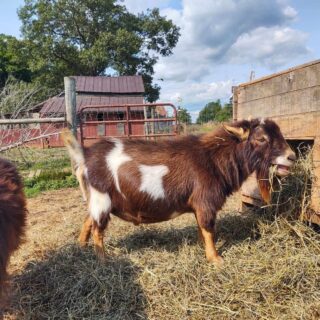
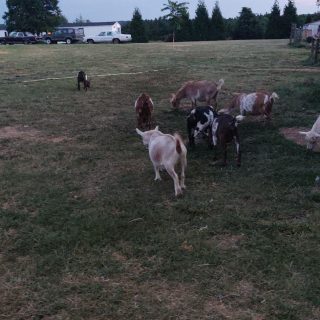
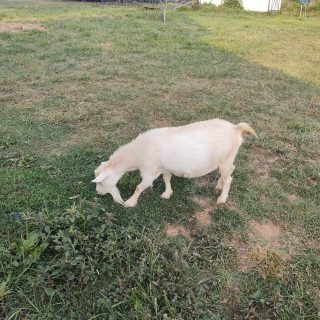
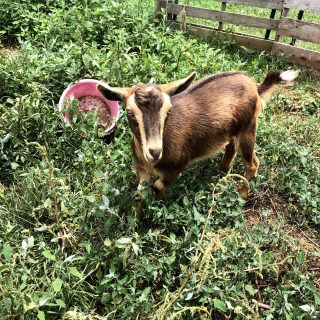
Vetta says
Does being in heat cause decrease?
MrAnimal Farm says
Yes, it can.
tony says
Thanks for the article. It helped me know how to decrease my milk production. I have 3 Nigerian Dwarfs (first year for me to milk them). Their kids are sold at this point. I'm getting over 4 quarts per day out of them... milking them twice a day. I only give them feed when they are in the milking stand (about a pint per milking). Even making cheese we just don't need a gallon a day.
I will drop my milking down to once a day... which means their feed will be dropped to once a day. They have access to good pasture all day. They might be uncomfortable for a few days during the transition, but I simply have nowhere to put the milk. 6-7 gallons of milk per week means we are drinking 2 gallons and making 3-4 pounds a cheese per week... that's too much!
Thanks, I'm open to feedback.
Rebecca says
5 yr old doe, 2nd freshening, one doeling only, born 5/12/19. Doe is getting 2 quarts feed per day, plus 1 quart while being milked 2x a day. Getting next to nothing. Have her on alfalfa hay from Tractor Supply as alfalfa is scarce in my area. 16% protein feed. First milking got 3 qts, then dropped to 3 cups, now MAYBE 3 Tbsp. This is one of my sons 4H show does, she placed in ribbons last year for udder class. Had 2 kids last year, 1st time freshening. HELP!!
MrAnimal Farm says
I would check to see if she has a health issue going on. Check temperature to see if she has a fever. Run a fecal to check for parasites. Is her kid still on her? She might be drinking her dry.
Savannah Clark says
Hello, I have a full blooded lamancha that gave birth a week ago. She rejected the baby so I've been milking since day one. I'd been getting a steady 8-10 oz (first freshening so no big deal) when suddenly at day 4 I can't even get 2oz out of her. She won't eat hardly anything and I just wormed her. I'm not sure what's going on, do you have any tips or suggestions to try?
MrAnimal Farm says
I would check if she has a fever - could be an infection. I would also have a fecal run to rule out worms or coccidia.
Cindy says
We have a 1/2 LaMancha, 1/2 Nubian goat who kidded Feb 22. We have recently begun milking her (1x per day, leaving the rest for the kids) However, we have only been able to get 7-9oz of milk per day (with one banner day of 16oz) This is her first kidding (and ours as well! - we have never had nor milked goats before). What are we doing wrong? Everything I've read says we should be getting a lot more milk.
Goats are fed lots of hay, have access to pasture and receive 3-4 cups of grain per day.
Your thoughts?
MrAnimal Farm says
Hi Cindy,
If you are not separating kids - they are probably drinking a boatload and it's not surprising that you are not getting much. Also, first freshening they are going to produce much less overall than they will at second, third and so on (when they become more fully mature). So, that is another factor.
If the kids were born 2/22 they are plenty old to separate them overnight (10-12hrs) and then milk mom in the morninng - I would suspect you will get A LOT more milk that way. Since they have not been separated before, I would probably start at about 8 hrs to make sure she doesn't get too full.
If separating still doesn't generate more milk - you may want to look at other factors. The first thing I would assess is wormload. Do a Famancha check and/or fecal to be sure she isn't overloaded as heavy wormload can cause less milk.
Let me know how it goes!
Best,
Kristin